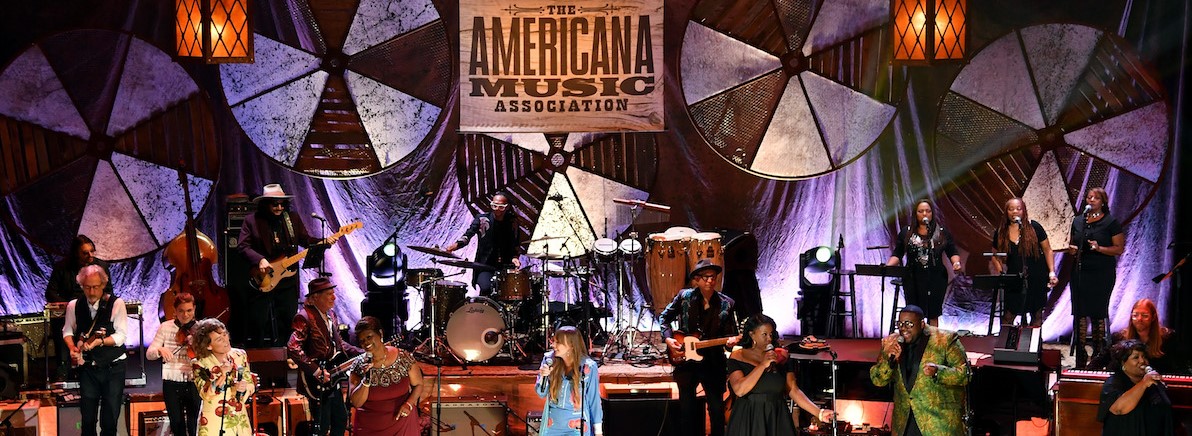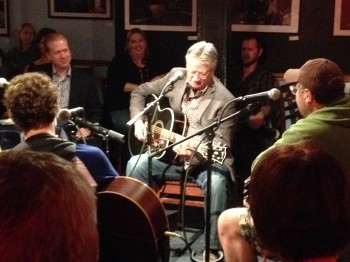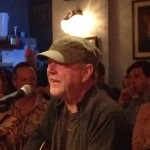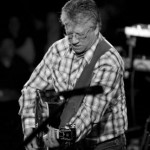By Terry Roland
The story is by-now a worn-out cliché. It even shows up on network television shows like Nashville. It goes like this: The influential elder statesmen who helped found a form of music popular today, is granted meetings with record label A&R executives ‘out of respect’ to hear their newest, vital work, only to be told ‘no’ to label support for release, promotion and distribution. Oh, they love the music, mind you. “It’s great,” they say. “The best of your career,’ they add. “But, we can’t help you.”
It’s hard to fathom. Especially when the work is as good as Richie Furay’s latest yet-to-be-released album, Hand in Hand. It is reason for pause in a genre known for its appreciation of timeless, age-defying and cross-generational music. That it is happening to the co-founding member of The Buffalo Springfield and Poco, a peer of Neil Young and Stephen Stills, is even more enigmatic and frustrating.
While ageism is all-too-common in the world of music today, the Americana scene has offered shelter from such clichéd responses to many veteran artists like Johnny Cash, Levon Helm, Rosanne Cash and Dr. John. Richie Furay deserves better. His new album is as vital, fresh and passionate as any new releases from younger artists. It stands alongside the best work of his peers today.
Hand in Hand can also serve as an introduction to Richie Furay whose career spans over five decades. The album begins at the beginning of his story.
“We were the dreamers shooting’ high for the stars
Making rock & roll music, playing country guitars.
We blazed a trail for generations to come
We were the dreamers, pioneers pressing on.”
This first song, “We Were the Dreamers,” opens with a lead guitar intro that echoes Paul McCartney’s simple riff from “The Two of Us” on The Beatles’ Let it Be, but then crashes into a familiar electric major 7th chord change, which is unmistakable in its Springfield essence. He rocks us through lyrics reflecting the simple truth of Richie Furay’s legacy, best summed up in the term, visionary. His words are a testament to the sound he helped create and his influence reverberates today.
“We Were the Dreamers” is more than an exercise in nostalgia or a history lesson; it is a quicksilver lightning-lit journey through the past to present day Americana music. Furay starts us with his past glories referring to his earliest days with Poco when they were the hottest country-rock band out of L.A. on the threshold of phenomenal national success.
It’s been 40 some years, 1969
On that Troubadour stage, it just seemed like our time
Laurel Canyon and Sunset that’s where we called home
We made certain our music had a sound all its own.
Then he leads us present day to a country music scene, where acceptance of rock and cultural undertones is a given, that he helped create:
Today out in Nashville, it echoes the sound
But back then redneck and hippie would never be found
On the same stage together, a few got it for sure
Today it’s just music, nothing less, nothing more.”
For Furay, who is undeniably humble and grateful for his place in music history, these words are not a matter of pride or arrogance, but a statement of fact. “We Were the Dreamers” sets the pace as he sings about the redeeming and healing power of music, faith, love and unity in the face of troubled waters ahead.
The Rock and Roll Hall of Fame inductee, who recently turned 70, was an important balancing member of the Buffalo Springfield. He made the all-too-brief historic 2011 reunion possible and creatively plausible. As in times of old, he offered a counterpoint to the critical but often tense creative energy between Stephen Stills and Neil Young, rivaling guitarists and singer-songwriters. Back in 1967 it was Furay who sweetened the sound with high harmony vocals, a dynamic stage presence that usually found him dancing with guitar in hand to his own unique songs. He led the band into a full-fledged country-rock sound.
To many, during the 2011 tour, Furay was the element of surprise, the artist many Springfield fans had lost track of since the times when he first blazed the country-rock trail. As he sang lead vocal on familiar classics like “On the Way Home,” “A Child’s Claim to Fame” and “Kind Woman,” he stepped out from the shadows of the iconic Stills and Young to a spotlight of his own, less worn and tattered around the edges than his Springfield comrades. The reviews of the shows in San Francisco, Santa Barbara, Los Angeles and at Bonnaroo in Tennessee, uniformly praised Furay’s presence, energy, vocal power and contributions to the band during the tour. In spite of a scheduled 30 city national tour, the band would return to their 40 year silence after their final appearance at Bonnaroo (a decision made by the ever changeable Young). But Furay was still restless with the creativity the tour had sparked.
Today, as Nashville producers casually bring in elements of rock music with popular young artists, as The Eagles forge ahead on established sold-out arena tours with constant radio and Internet airplay, and as new artists build on the country rock sound forged so long ago under California skies, Richie Furay’s influence is tangible.
Even so, the most common response when people hear Furay’s recent albums is, “Man, he sounds like The Eagles!” To be more accurate, the opposite is true. The Eagles adapted the sound of Richie Furay long ago. As he tells it today, it was Glen Frey who once helped Poco draw up their set lists for their early appearances. He and Don Henley were present at the band’s early rehearsals.
Poco’s original engagements at Doug Weston’s Troubadour in Los Angeles was a high water point for much of the fledging Southern California country rock scene where artists like Rick Nelson and The Eagles would take their cue from Furay for their own musical direction. The Poco shows and the subsequent tours were dynamic, energetic, passionate and hard rocking performances that took no prisoners. Furay was the undisputed front man for this trailblazing band that saw two future members of The Eagles pass through its ranks (Timothy B. Schmidt and Randy Meisner). Poco never attained the level of stardom found by imitators like The Eagles, but their mark was felt and capitalized on.
Furay was so important to the country-rock sound that Eagles’ label owner, David Geffen, signed him to Asylum Records where he released a pair of albums with ‘supergroup’ Souther, Hillman and Furay (SHF) scoring a top 20 hit with his own song, “Falling in Love.” SHF never quite worked as a cohesive band and disbanded during the recording of their second album. This was followed by a series of critically acclaimed but commercially failed solo albums released between 1975 and 1981, most notably I’ve got A Reason and Dance A Little Light.
It was after 1981 that Furay quietly withdrew from mainstream popular music, raising his family and taking on a Calvary Chapel pastorate at his home in Broomfield, Colorado. During the intervening years he would release two devotional Christian based album, “In My Father’s House” and “I Am Sure” with the help of Poco members, Rusty Young Paul Cotton and Jim Messina.
When he remerged in 2003, the country-rock focused Heartbeat of Love was the fulfillment of his post-Poco career promise. His soulful energy drove the good-time surface of many of the songs. But it is that soul beneath the style that gives his work its timelessness. It was his prodigal return to country-rock. It also included Stills and Young on separate tracks.
Heartbeat was a reminder of Furay’s signature vocal sound. It is the natural, effortless style of his voice that others have built their own vocal styles on. But, while the sound may be similar, it’s the soul beneath that is impossible to recreate. He merges Buck Owens and Otis Redding. In his own unique way he is as much a soul singer as country.
It’s the authenticity of his voice that makes Hand in Hand is such a pleasure. His voice is in full force, driving the melody and the rhythm through familiar territory and into the rough terrain of life today. Not so young anymore, but quite a bit wiser, he is always ready to rock. On this new album, he sounds more like an impassioned artist in his ‘30s rather than a seasoned vocalist who just turned 70.
Hand in Hand adds nuance and dimension to what he started on Heartbeat of Love. It is an album of Furay signature country rock that calls up the best spirit of The Buffalo Springfield and Poco. While the album still carries the expected love songs and good time rockers(“Still Fine” “Love at First Sight”), much of the album reflects his latter day Poco and 70’s solo work. He moves into deeper waters with a global message to America as a country of people divided and disillusioned by economic woes and political controversy.
After “We Were the Dreamers” aptly opens the album, Furay turns back to his ‘kind woman,’ for inspiration on the title track, “Hand in Hand” and delivers another classic love song that stands alongside “Good Feeling’ to Know,” and “Just For You and Me,” from the peak of his Poco days. There is a gospel-soul feel to his interpretation of an obscure Dan Fogelberg song, “Don’t Lose Heart,” that is infectious, inspiring and goose-bump producing.
The album turns on three songs about the American journey in the second decade of the 21st century, a trilogy of sorts. These are the center piece of the album. Opening with “Don’t Tread on Me,” a call to patriotic unity over the politics of partisanship, it speaks to today’s polarization and divisiveness. This is Furay transcending his familiar love song themes. It’s the same artist who once reached out to his friend, Gram Parsons as he was fading into his own self-destructiveness with the impressionistic epic “Crazy Eyes.” On “Don’t Tread on Me,” Furay sings to the people of America. It is a call to unity as he cries, “My heart bleeds red, white and blue as I recall, united we stand, divided we fall,” and asks us to bypass political bias to remember our collective “heart of gold.” “Wind of Change,” with an underlying fiddle and banjo, speaks to the hope of a new day in the aftermath of today’s discouraged and burned-out America.
When the sun shines in the morning
Bringing the dawn of brand new day
If we can just hold on until tomorrow
Maybe we can set things straight again
Before we lose it all to the wind…”
“Someday,” completes the trilogy with hope and an upbeat tempo that is danceable in the best Poco sense. It’s a celebration of the soul familiar to Furay’s best work pointing us to healing, hope and faith as we return to our better angels.
Hopefully, the release of this album will be soon. It will, of course, take something more than cliché’s and lip-service for this to happen. It will take A&R people who possess the same kind of heart, vision and energy that Furay exudes on this record to get it out in the light of day where it belongs. It belongs as a part of our national soundtrack as we walk into the dawn of a brand new day.
Hand in Hand is among Richie Furay’s strongest albums with a clear statement of both musical vision and personal growth through dark economic and spiritual times. Its soul rests on the hope found in what Furay has communicated throughout his career; that the heart of musical expression centered on faith and celebration is our greatest resource, be it for a night of good time music or a life built on the hope of things unseen, but known to be true. Its appeal is in the melodic energy and inspiration found in one of America’s founding fathers of country-rock.
Follow Sun209 on Twitter at @Sun209com.



 by Terry Roland
by Terry Roland